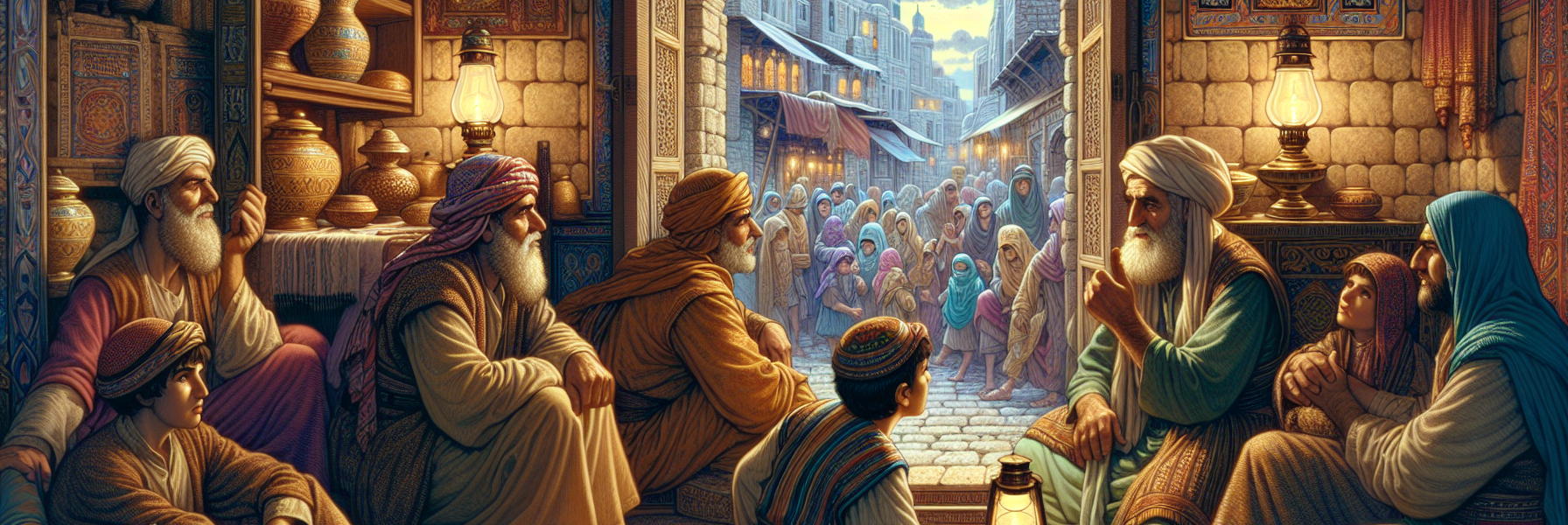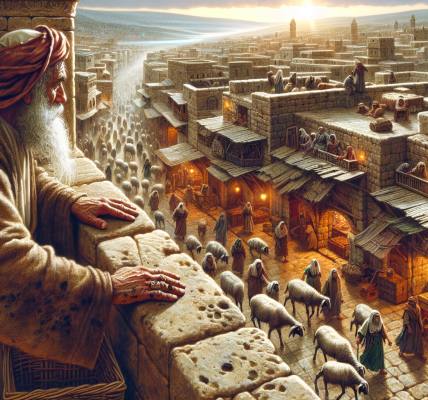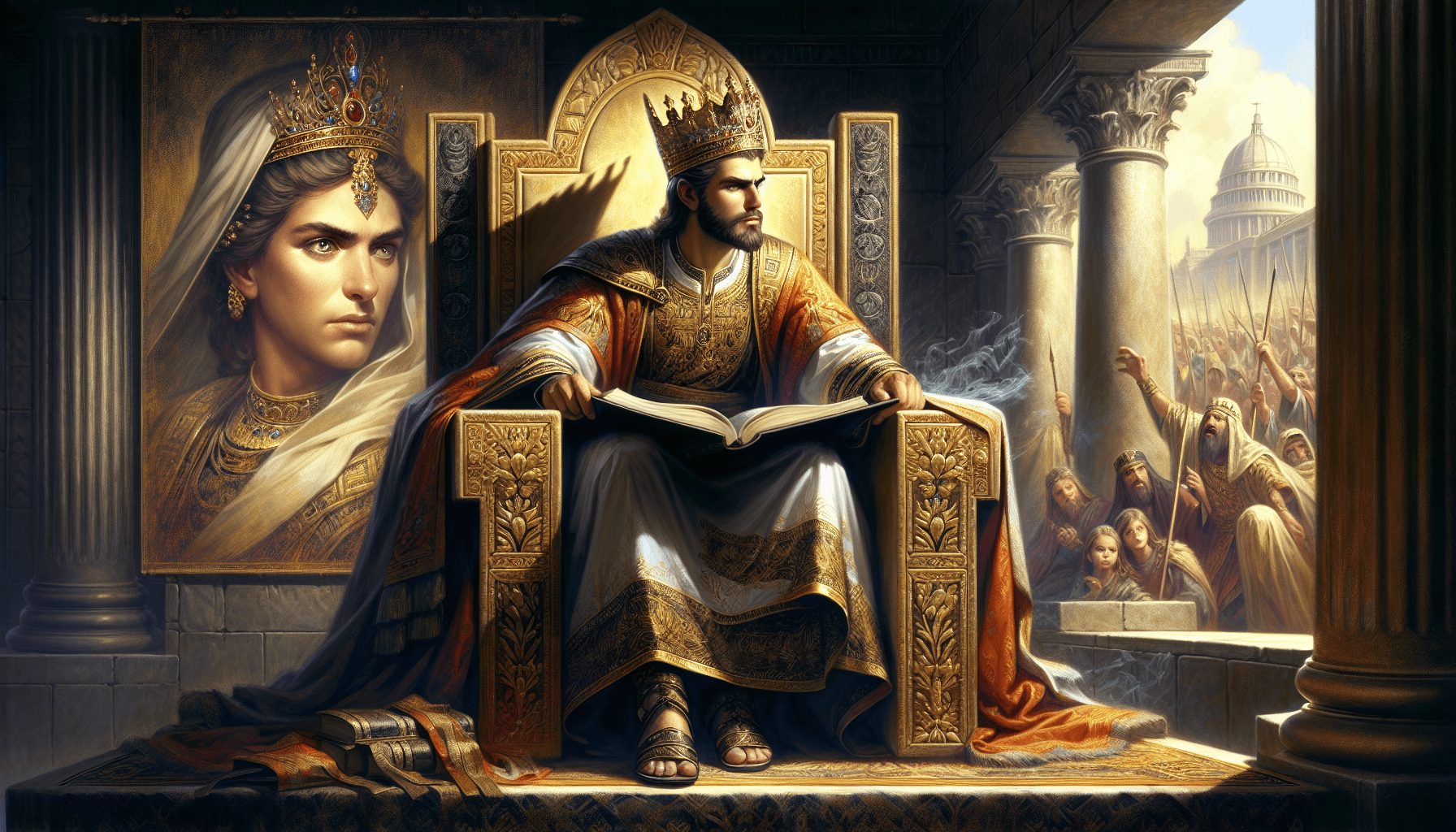**The Wisdom’s Call: A Tale of Two Paths**
In the bustling city of Jerusalem, where merchants haggled in the marketplace and children played in the narrow streets, there lived a young man named Eliab. He was the son of a respected scribe, trained from childhood in the Law of Moses, yet his heart often wandered to the allure of quick riches and reckless companions. His father, seeing the dangerous path his son was drawn to, sat him down one evening beneath the flickering light of an oil lamp.
“My son,” the old man began, his voice steady but heavy with concern, “hear the instruction of your father, and do not forsake the teaching of your mother. For they will be a graceful garland for your head and pendants for your neck.”
Eliab shifted uncomfortably, his eyes darting to the window where laughter from the streets below drifted in. His friends, a band of young men who boasted of their schemes, had promised him a share in their latest venture—a plan to deceive a wealthy trader. The thought of silver coins jingling in his pouch made his pulse quicken.
Yet his father continued, his words like a steady stream carving through stone. “My son, if sinners entice you, do not consent. If they say, ‘Come with us, let us lie in wait for blood; let us ambush the innocent without reason…’ do not walk in the way with them. For in vain is a net spread in the sight of any bird, and these men lie in wait for their own blood; they set an ambush for their own lives.”
Eliab clenched his fists. He knew his father spoke truth, yet the temptation gnawed at him. That very night, he slipped out into the darkened streets, where his companions waited with eager grins.
“Tonight,” their leader, a cunning youth named Asa, whispered, “we take what is ours. The merchant from Damascus sleeps with his purse unguarded. Who will know if a few coins go missing?”
For a moment, Eliab hesitated. The words of his father echoed in his mind, but the jeers of his friends drowned them out. “Are you afraid?” one taunted. “Or are you still a child clinging to your father’s robes?”
Shame burned in Eliab’s chest. He nodded, and they moved like shadows through the night.
### **The Ruin of Fools**
The plan unfolded swiftly—too swiftly. The merchant, as it turned out, was not asleep but waiting with hired guards. A shout rang out, torches flared, and suddenly the young men were fleeing in terror. Eliab’s heart pounded as he stumbled through the alleys, his breath ragged. Behind him, the cries of his captured friends pierced the night.
He escaped, but his soul was not free. Guilt settled upon him like a heavy cloak. Days passed, and the news spread: Asa and the others had been sentenced to hard labor for their crimes. Eliab, though unseen, was haunted.
Then, one evening, as he sat alone by the city gates, a voice seemed to whisper on the wind—not the mocking laughter of his companions, but something deeper, wiser.
*”How long, O simple ones, will you love being simple? How long will scoffers delight in their scoffing and fools hate knowledge?”*
Eliab turned, but no one was there. Yet the words resonated within him, as though Wisdom herself stood in the streets, lifting her voice for all to hear.
*”Turn at my reproof; behold, I will pour out my spirit to you; I will make my words known to you.”*
Tears filled his eyes. He thought of his father’s warnings, of the ruin that had befallen his friends. He had chosen folly, and it had nearly destroyed him.
### **The Two Paths**
That night, Eliab returned home and fell at his father’s feet. “I have been a fool,” he confessed. “I listened to the wicked and ignored your wisdom.”
His father, though grieved, embraced him. “The fear of the Lord is the beginning of knowledge, my son. Fools despise wisdom and instruction, but those who listen will dwell secure, untouched by terror.”
From that day forward, Eliab walked a different path. He studied the Law, sought understanding, and in time, became a counselor to many. When he saw young men being led astray, he spoke the words once spoken to him:
*”Wisdom cries aloud in the street, in the markets she raises her voice. Do not be like those who refuse her call, for when calamity comes, they will cry out—but it will be too late.”*
And so, the tale of Eliab became a warning and a hope—a reminder that though folly sings a sweet song, Wisdom’s voice endures forever, calling all who will listen to walk in the way of life.




